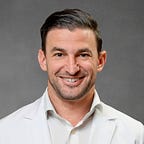I’m Not Ok
Originally written as a twitter thread which went viral, then adapted as an Op-Ed for the Washington Post.
He came in by ambulance short of breath. He was already started on CPAP by the paramedics. Still, he was clearly working hard to breathe. He looked sick. Uncomfortable. Scared.
He was solidly built. Older. His methamphetamine use over the years had taken its usual toll and his teeth were all but gone. As we got him over to the gurney and his shirt off to switch to a hospital gown, we all noticed the number of Nazi tattoos. The swastika stood out boldly on his chest. SS tattoos and other insignia that had previously been covered by his shirt were now obvious to the room.
“Don’t let me die, doc.” He said breathlessly as the RT switched him over from CPAP by EMS to our mask and machine. I reassured him that we were all going to work hard to take care of him and keep him alive as best as we could. All of us being a team that included a Jewish physician, a Black nurse, and an Asian respiratory therapist.
We all saw. The symbols of hate on his body outwardly and proudly announced his views. We all knew what he thought of us. How he valued our lives. Yet here we were, working seamlessly as a team to make sure we gave him the best chance to survive that we could. All while wearing masks, gowns, face shields, gloves. The moment perfectly captured what we are going through as healthcare workers as this pandemic accelerates.
We exist in a cycle of fear and isolation. Fear of getting sick on the front lines. Fear of bringing a virus home and exposing our families. Fear of the developing surge of patients. Fear of losing our colleagues. Fear of not having what we need to take care of patients. Isolation because we don’t want to be responsible for spreading the virus, knowing that we are surrounded by it on a daily basis. Isolation because no one else can truly understand this feeling, these fears, the toll of this work. But we soldier on.
Unfortunately, society has proven unwilling to listen to the science or to our pleas. Begging for people to take this seriously, to stay home, wear a mask, to be the break in the chain of transmission. Instead, they’ve called the pandemic a hoax, called us liars and corrupt, told us we are being too political by worrying about patients dying and trying to save lives. They’ve stopped caring about our lives, our families, our fears, worried only about their own.
He was already on high respiratory support and still working hard to breathe so I asked him about his code status and if he would want to be intubated, knowing that was all but inevitable and before the hypoxia made him more confused and unable to answer. He said that if a breathing tube was the only way he could survive, he wanted us to do everything we could. So we would. We were out of other options by this point, so we prepared.
I’ve faced these situations countless times since medical school. Not the intubation — which is routine at this point for me and my team. The swastikas. The racist patients. Every single time I feel a bit shaken, but I went into this job wanting to save lives and every single time I’ve been able to smoothly and quickly move though those emotions to do so. “They came here needing a doctor, and dammit Taylor, you’re a doctor” is a mantra I’ve repeated to myself when I feel like my empathic core wanes.
As I stepped out of the room to gear up for a high risk procedure and grab equipment, I checked my PPE. I had my N95, face shield, gown, gloves. Was I safe? Was my team safe? I pause to check and make sure I had all my equipment and backups if needed. I run through the meds and plan with the nurse and RT. I pause. I see the SS tattoo and think about what he might think about having Jewish physician taking care of him now, or how much he would have cared about my life if the roles were reversed.
For the first time, I recognize that I hesitated, ambivalent.
The pandemic has worn on me, and my mantra isn’t having the same impact in the moment. All this time soldiering on against the headwinds, gladiators in the pit.
And I realize that maybe I’m not ok.
